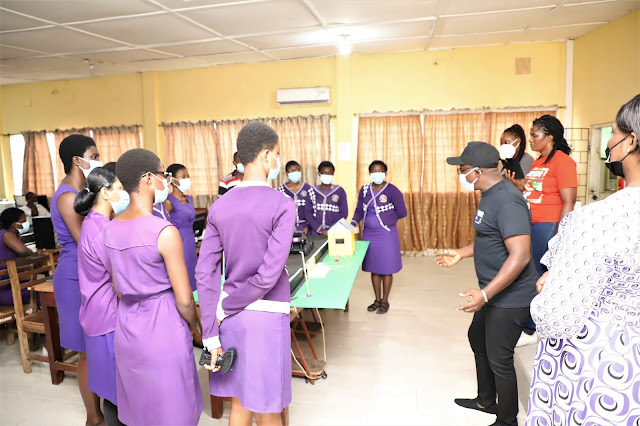The GMES and Africa Project at the University of Ghana's newest endeavour aims to provide mentorship and an enabling environment for Women in Technology (WIT). The campaign was launched with a visit to the Mfantsiman Girls' Senior High School, which won the second edition of the Senior High Schools' Renewable Energy Challenge 2021 for the southern zone.
 |
| Prof. George Wiafe, engaging some Mfantsiman Girls |
To close the gender gap in technology, it is critical to educate the youth, particularly young girls and women, about the value of technology and how the Internet of Things (IoT) may be integrated into their academic, research, and future careers. “
Women are sometimes disadvantaged as they advance in their careers when they are unable to: use IoT, Big Data, and Open Sources tools, have access to mentorship or work in an enabling environment,” says Prof. George Wiafe, Director of the Regional Marine Centre at the University of Ghana. The goal of UG-GMES' WIT program is to give young girls in senior high schools the opportunity to adopt these available technologies.
The administrators of the Mfantsiman Girls' SHS, led by the Headmistress Mrs Phyllis D. Arthur-Simpson, welcomed the delegation from the University of Ghana. The initiative's goal thrilled the headmistress, who believes it is the first of its kind and that more schools would jump on board to take advantage of the fantastic opportunity. She also mentioned some of the difficulties they've encountered since creating the ICT and STEAM clubs. Proprietary software, a shortage of trainers, difficulties in accessing data, inadequate internet connectivity, non-availability of IoT kits and sensors, the absence of an enabling environment, and funding issues were among the challenges.
 |
A group picture of the UG team and Administrators of Mfantsiman Girls’ SHS
|
Representatives from the school's tech clubs were on hand to show off a few of the things they had created utilizing IoT and open-source software. The first was a humanoid robot that could detect whether or not someone was wearing a nose mask and then automatically distribute hand sanitiser. The other team had a system on exhibit that could create electricity while automobiles drove down the road. The desire to use open-source tools and IoT to make life easier was shared by both teams, as voiced by the students.
 |
Mfantsiman Girls' demonstrating some of the products they created
“I am somewhat the lazy kind and like things done in the easiest and fastest way,” Abena, one of the students, explained, “So for me, the only alternative or way out was to join the club and learn how to use these things to solve my problems.”
Senior High School girls have the opportunity to cooperate with the regional west African GMES and Africa project run at the University of Ghana. The goal is to reach out to all coastal girls secondary schools and pique their interest in the use of the IoT, Big Data and Open Source technologies. The Aggrey Memorial Senior High School in Cape Coast, Ghana's central region, is the next in line. |






Comments
Post a Comment